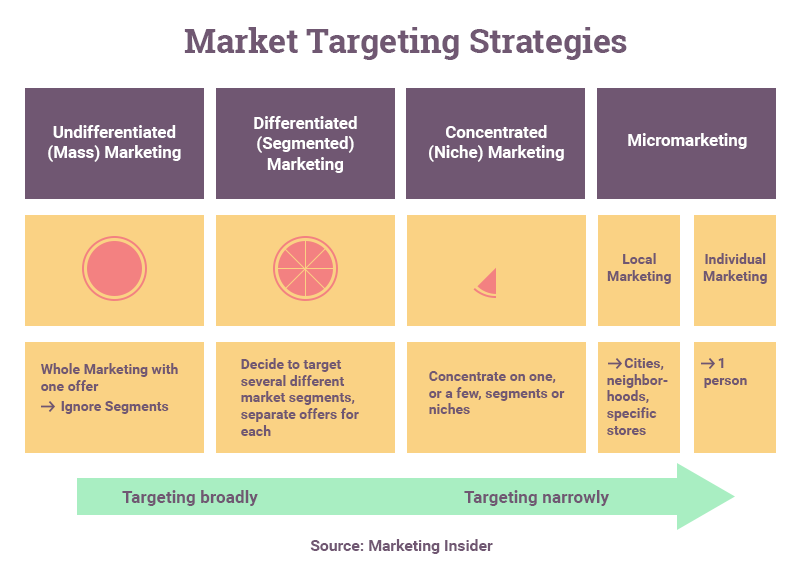So, you’re interested in mastering the craft of differentiated marketing, huh? That’s fantastic! In today’s competitive business world, it’s more important than ever to stand out from the crowd. And that’s exactly where differentiated marketing comes into play. It’s all about pinpointing unique selling points that set your business apart from the rest.
Delving further into this article, you’re going to gain an in-depth understanding of differentiated marketing. You’ll discover strategies to help your business shine in its own light, and not get overshadowed by competitors. Buckle up, because this is going to be an enlightening journey into the world of specialized marketing strategies that are tailored for the success of your unique business.

This image is property of miro.medium.com.
Understanding Differentiated Marketing
Definition of Differentiated Marketing
Let’s start by defining what differentiated marketing is. Simply put, it’s a marketing strategy where a company develops different marketing mix and strategies for different market segments. It’s all about personalizing, tailoring your products and services to cater to these different market segments, providing a unique value proposition for each one.
Importance of Differentiated Marketing in the Current Business Landscape
In an increasingly competitive business landscape, standing out from the competition is crucial. This is where differentiated marketing comes in. It helps your business cut through the clutter and reach your target audience more effectively by specifically addressing their needs and wants.
Core Principles of Differentiated Marketing
Differentiated marketing rests on the principles of market segmentation, target marketing, and market positioning. It utilizes in-depth market research, customer data, and a strong understanding of your target audience to develop individualized strategies for unique market segments. The goal? To ensure your products and services strongly appeal to different groupings within your market.
Implementing Differentiated Marketing Strategy
Steps in Developing a Differentiated Marketing Strategy
Building a differentiated marketing strategy starts with understanding your audience, analyzing market segments, and creating a unique marketing mix for each segment.
Identifying Target Audience
This involves delving into who your customers are, what they want, and what problems they need solved. By profiling your audience, you can ensure your marketing messages hit the right chord.
Analyzing Market Segments
Segmenting your market into meaningful, manageable sectors is a vital step. This involves grouping your customers into different categories based on criteria like demographics, psychographics, geographical locations, and buying behavior.
Creating Unique Marketing Mix for Each Segment
Once you’ve identified your market segments, you need to create a unique marketing mix for each one. This involves tailoring your product, pricing, placement, and promotional strategies to cater to each segment’s specific needs and preferences.
Examples of Differentiated Marketing
Case Studies of Successful Differentiated Marketing
Take Coca-Cola, for example. They use differentiated marketing to cater to distinct geographic regions, tastes, and lifestyles, offering different products and marketing messages for each segment. Or consider Nike, who tailors their marketing and product offerings based on athletic level, gender, and age.
Benefits of Differentiated Marketing
Increased Market Share and Brand Awareness
Differentiated marketing can help you capture a larger share of the market and boost brand awareness. When your products cater to specific market segments’ needs, customers are likely to choose you over generic alternatives.
Higher Customer Satisfaction
Differentiated marketing can also lead to higher customer satisfaction. Customers appreciate feeling understood and catered to, which is exactly what differentiated marketing achieves.
Competitive Advantage
A successful differentiated marketing strategy can give you a significant competitive edge. It can help you capture market gaps that your competitors haven’t yet identified, giving you the opportunity to become an industry leader.

This image is property of rockcontent.com.
Challenges in Differentiated Marketing
Operational Costs
However, implementing a differentiated marketing strategy isn’t without its challenges. The cost of operation could increase because you’re handling multiple campaigns for distinct market segments.
Risk of Brand Dilution
There’s also the risk of brand dilution. Running different campaigns can potentially confuse your audience and dilute your brand image.
Complexity in Managing Different Campaigns
Managing several campaigns simultaneously can be complex and time-consuming. You’ll need to track and measure the performance of each campaign, adjusting strategies as necessary.
Technologies that Enhance Differentiated Marketing
Role of Data Analytics
Data analytics can play a crucial role in differentiated marketing. By providing insights into customer behavior and segment performance, data analytics can help you fine-tune your strategies and maximize ROI.
Impact of Artificial Intelligence in Differentiated Marketing
AI can automate and personalize your marketing efforts. With capabilities like predictive analytics and machine learning, AI can help you understand your customers on a much deeper level.
Usage of Customer Relationship Management (CRM) Systems
CRM systems can help you manage your customer relationships more effectively, ensuring your marketing strategies are customer-focused and data-driven.

This image is property of Amazon.com.
Role of Social Media in Differentiated Marketing
Leveraging Social Media Platforms
Social media is a powerful tool for differentiated marketing. It allows you to reach specific audience segments with tailored content, engage with your customers in real-time, and gather valuable insights into your audience’s behaviors and preferences.
Personalized Marketing Strategies on Social Media
You can use targeted ads, personalized content, and interactive features to engage with different market segments on social media, enhancing the effectiveness of your differentiated marketing strategy.
Fine-tuning Your Differentiated Marketing Strategy
Continuous Market Research
Differentiated marketing requires continuous market research. You need to stay up-to-date with your target audience’s changing preferences, needs, and behaviors to ensure your strategies remain relevant.
Adapting to Customer Preferences
In today’s customer-centric era, being able to adapt your strategies based on customer feedback and preferences is crucial for the success of your differentiated marketing efforts.
Feedback Mechanisms
Similarly, implementing feedback mechanisms can help you gather valuable customer insights, allowing you to enhance your strategies and improve customer satisfaction.

This image is property of www.socoselling.com.
Failures in Differentiated Marketing
Analyzing Reasons behind Poorly Executed Differentiated Marketing Strategies
When differentiated marketing strategies fail, it’s important to analyze why. Understanding these reasons can help you avoid similar pitfalls in the future.
Learning from the Mistakes
Mistakes provide valuable learning opportunities. So, by analyzing failed differentiated marketing campaigns, you can gain insights that’ll help ensure your future strategies are more effective.
Conclusion: Mastering the Craft of Differentiated Marketing
Key Takeaways
Mastering the craft of differentiated marketing requires a keen understanding of your target audience, a systematic approach to segmenting your market, and a commitment to creating personalized marketing strategies for each segment.
Future of Differentiated Marketing
As technology continues to advance and customer expectations continue to evolve, the future of differentiated marketing will likely focus even more on personalized, data-driven strategies. In mastering this craft, you unlock the potential to drive higher customer satisfaction, gain a competitive edge, and ultimately, facilitate your business’s success in today’s competitive landscape.